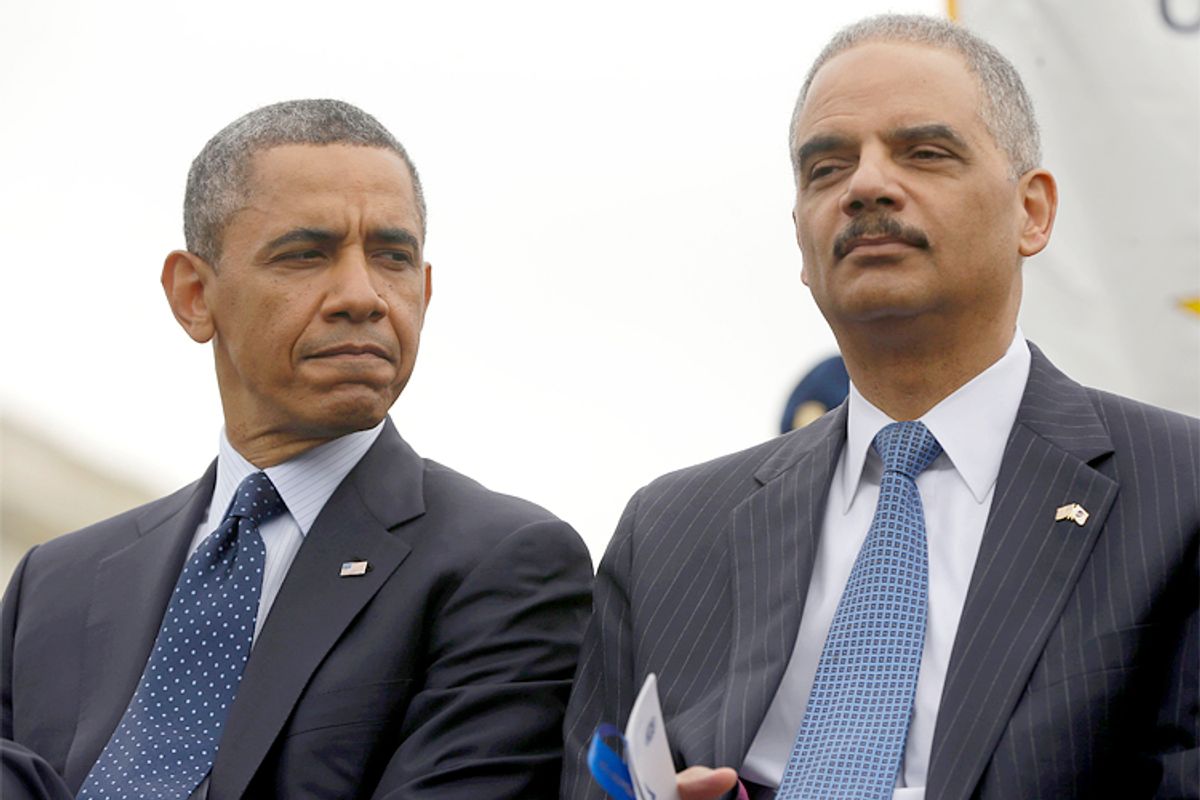In a departure from his 2008 campaign rhetoric of hope and change aimed at creating bipartisan consensus in Washington D.C., President Barack Obama plans to dedicate his post-presidency to helping Democrats win elections nationwide by tackling redistricting reform — and he's hand-picked Eric Holder to lead the charge.
The new group, called the National Democratic Redistricting Committee, will be led by former Attorney General Eric Holder, Politico reported Monday. Holder helped oversee the administration’s redistricting litigation while he served under the president.
With Republicans at the helm in statehouses nationwide, after the 2010 census, several traditionally Republican states got more House representatives, while blue states lost some. That is because Republicans controlled the process by which district maps are drawn, creating districts favorable to Republicans. This process, known as gerrymandering, is the secret to Republicans winning a majority in the House of Representatives. In 2014, Republicans got 52 percent of the votes but won 57 percent of the seats.
Despite the president's early ambitions to break the partisan stalemate in Congress, throughout his two terms in office lower Democratic turnout in midterm years has enabled Republicans to win governors' races and statehouse races that consolidate power in state capitals. Between 2008 and 2015, Democrats lost 13 Senate seats, 69 House seats, 913 state legislative seats, 11 governorships and 32 state legislative chambers, according to data compiled by University of Virginia professor Larry J. Sabato.
The picture doesn’t look any rosier for Democrats in the immediate future. In 2018, the party will already be defending five Senate seats in historically red states, as well as another six in states that backed Republicans in 2010. They will also have to defend any House seats they gain this fall.
In August 2015, Obama discussed at length his feelings on a system that he suggested was rigged to favor Republicans.
“I think political gerrymandering has resulted in a situation in which — with 80 percent Democratic districts or 80 percent Republican districts and no competition, that that leads to more and more polarization in Congress, and it gets harder and harder to get things done,” he said during an interview with NPR.
The new National Democratic Redistricting Committee will coordinate campaign strategy, direct fundraising, organize ballot initiatives and put together legal challenges to state redistricting maps. According to Politico, the organization formally registered with the Internal Revenue Service on August 15, but saw initial plans to be active in this year’s upcoming elections fail to materialize in time.
The issue advocacy group plans to first get involved in the Virginia and New Jersey state elections next year before working on gubernatorial, state legislative and House races going into the 2018 midterms. The gubernatorial candidates who win in 2017 and 2018 are the ones who’ll be in office to approve the maps for the 2022 elections, put together by the state legislators elected along with them.
“American voters deserve fair maps that represent our diverse communities – and we need a coordinated strategy to make that happen,” Holder said in a statement. “This unprecedented new effort will ensure Democrats have a seat at the table to create fairer maps after 2020.”
White House political director David Simas indicated to Politico that the redistricting effort will be the president’s top priority after he leaves the White House.
“Where he will be most politically engaged will be at the state legislative level, with an eye on redistricting after 2020,” Simas, who’s been briefing Obama on the group’s progress since it started coming together at the beginning of the summer, said.
In his final State of the Union address, Obama called for the end of gerrymandering.
"I think we've got to end the practice of drawing our congressional districts so that politicians can pick their voters, and not the other way around," the president said.
House Majority PAC executive director Ali Lapp, who will serve as the group's vice president, told the Washington Post that the group hopes to attract support not just from Democratic party officials but from a wide coalition of liberal activists that includes labor unions, environmental organizations, labor unions and immigration reform activists.
“This was what was needed: an entity that cared about nothing but redistricting,” Lapp said of the effort to wrestle power back to Democrats
“None of this matters if you don’t have more funders brought to the table,” she told the Post, adding that Obama's and Holder's participation “gives it a heft and a gravitas that’s really needed when you’re asking people to put larger goal ahead of their own goal, when the time comes.”
She added: “That this was what was needed: an entity that cared about nothing but redistricting.”



Shares